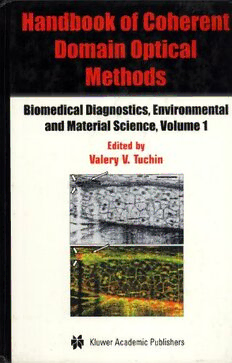
Handbook of Coherent Domain Optical Methods: Biomedical Diagnostics, Environmental and Material Science PDF
Preview Handbook of Coherent Domain Optical Methods: Biomedical Diagnostics, Environmental and Material Science
How to go to your page This eBook contains two volumes. Each volume has its own page numbering scheme, made up of a volume number and page numbers, separated by a colon. For example, to go to page 35 of Volume 1, enter 1:35 in the “page #” box at the top of the screen and click “Go”. To go to page 35 of Volume 2, enter 2:35, and so on. COHERENT-DOMAIN OPTICAL METHODS Biomedical Diagnostics, Environmental and Material Science Volume 1 This page intentionally left blank COHERENT-DOMAIN OPTICAL METHODS Biomedical Diagnostics, Environmental and Material Science Volume 1 Edited by VALERY V. TUCHIN Saratov State University and Precision Mechanics and Control Institute of the Russian Academy of Sciences, Saratov, 410012 Russian Federation KLUWER ACADEMIC PUBLISHERS NEW YORK,BOSTON, DORDRECHT, LONDON, MOSCOW eBookISBN: 1-4020-7882-X Print ISBN: 1-4020-7885-4 ©2005 Springer Science + Business Media, Inc. Print ©2004 Kluwer Academic Publishers Boston All rights reserved No part of this eBook maybe reproducedor transmitted inanyform or byanymeans,electronic, mechanical, recording, or otherwise, without written consent from the Publisher Created in the United States of America Visit Springer's eBookstore at: http://ebooks.springerlink.com and the Springer Global Website Online at: http://www.springeronline.com Contents Contributing Authors xi Preface xv xxi Acknowledgments PART I: SPECKLE AND POLARIZATION TECHNOLOGIES 1. Light Correlation and Polarization in Multiply Scattering Media: Industrial and Biomedical Applications 3 Dmitry A. Zimnyakov 1.1 Introduction: Interference and Polarization Phenomena at Multiple Scattering 3 1.2 Temporal and Angular Correlations of Light Scattered by Disordered Media 5 1.3 Damping of Polarization of Light Propagating through the Disordered Media 9 1.4 Industrial and Biomedical Applications 25 1.5 Summary 38 References 38 vi COHERENT-DOMAIN OPTICAL METHODS 2. Optical Correlation Diagnostics of Surface Roughness 43 Oleg V. Angelsky and Peter P. Maksimyak 2.1 Introduction 43 2.2 Theoretical Background 46 2.3 Computer Simulation 50 2.4 Dimensional Characteristics of Objects and Fields 58 2.5 Experimental Study 63 2.6 Singular Optics Concept 69 2.7 Zerogram Technique 75 2.8 Optical Correlation Technique 81 2.9 Conclusions 89 References 90 3. Laser Polarimetry of Biological Tissues: Principles and Applications 93 Alexander G. Ushenko and Vasilii P. Pishak 3.1 Introduction 93 3.2 Optical Models of Tissue Architechtonics 95 3.3 Polarization and Coherent Imaging 99 3.4 Stokes-Correlometry of Tissues 114 3.5 Wavelet-Analysis of Coherent Images 124 3.6 Summary 134 References 136 4. Diffusing Wave Spectroscopy: Application for Skin Blood Monitoring 139 Igor V. Meglinsky and Valery V. Tuchin 4.1 Introduction 139 4.2 Skin Structure and Sampling Volume 142 4.3 Principles of the Diffusing Wave Spectroscopy 144 4.4 DWS Experimental Approach and Data Analysis 148 4.5 Main Results and Discussion 150 4.6 Summary 158 References 159 COHERENT-DOMAIN OPTICAL METHODS vii 5. Laser Speckle Imaging of Cerebral Blood Flow 165 Qingming Luo, Haiying Cheng, Zheng Wang, and Valery V. Tuchin 5.1 Introduction 165 5.2 Principles of Laser Speckle Imaging 166 5.3 Instrumentation and Performances 169 5.4 Applications 170 5.5 A Modified Laser Speckle Imaging Method with Improved Spatial Resolution 182 5.6 Conclusion 190 References 192 PART II: HOLOGRAPHY, INTERFEROMETRY, HETERODYNING 6. Low Coherence Holography 199 Paul French 6.1 Introduction to Low Coherence Holography 199 6.2 Phase-Stepping Interferometric Imaging 203 6.3 Off-Axis Holography 205 6.4 Photorefractive Holography 211 6.5 Conclusions and Outlook 226 References 229 7. Diffraction of Interference Fields on Random Phase Objects 235 Vladimir P. Ryabukho 7.1 Introduction 235 7.2 Collimated Interference Fields 237 7.3 Focused Spatially-Modulated Laser Beams 250 7.4 Interference Fringes in Imaging Systems 262 7.5 Interference Fringes Formed by Scattering Optical Elements 280 7.6 Industrial and Biomedical Applications 293 7.7 Summary 312 References 314 8. Heterodyne Techniques for Characterizing Light Fields 319 Frank Reil and John E. Thomas 8.1 Introduction to HeterodyneDetection 319 8.2 Optical Coherence Tomography (OCT) 323 8.3 Optical Phase-Space Measurements 326 viii COHERENT-DOMAIN OPTICAL METHODS 8.4 Wigner Phase-Space Measurement 328 8.5 Applications 339 8.6 Summary 350 References 351 PART III: LIGHT SCATTERING METHODS 9. Light Scattering Spectroscopy: from Elastic to Inelastic 355 Lev T. Perelman, Mark D. Modell, Edward Vitkin, and Eugene B. Hanlon 9.1 Introduction 355 9.2 Principles of Light Scattering Spectroscopy 356 9.3 Applications of Light Scattering Spectroscopy 359 9.4 Principles of Raman Scattering Spectroscopy 373 9.5 Applications of Raman Spectroscopy 374 9.6 Near-infrared Raman Spectroscopy for in vivo disease diagnosis 380 9.7 Surface-Enhanced Raman Spectroscopy 386 References 392 10. Laser Doppler and SpeckleTechniques for Bioflow Measurements 397 Ivan V. Fedosov, Sergey S. Ulyanov, Ekaterina I. Galanzha, Vladimir A. Galanzha, and Valery V. Tuchin 10.1 Introduction 397 10.2 Basic Principles of LaserDoppler and Speckle Techniques 398 10.3 Biomedical Applications of Laser Doppler and Speckle Techniques 413 10.4 Speckle-Correlation Measurements of Lymph Microcirculation in Rat Mesentery Vessels 423 10.5 Conclusion 431 References 432 11. Quasi-Elastic Light Scattering in Ophthalmology 437 Rafat R. Ansari 11.1 Introduction 437 11.2 QELS and Disease Detection 440 11.3 Early Detection of Ocular and Systemic Diseases 444 11.4 QELS Limitations 457 11.5 Future Outlook (Ophthalmic Tele-Health) 459
